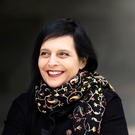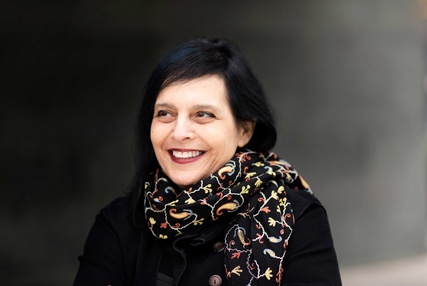FRANK MADLENER : Pourriez-vous nous parler de l’espace que vous créez avec POETICA – vous parlez notamment de « palais de la mémoire » – et du sentiment de cohésion que vous voulez instaurer dans cet espace ?
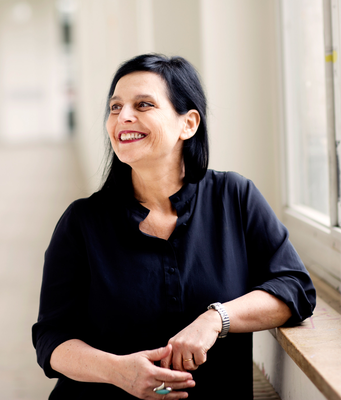 CHAYA CZERNOWIN : Je ne parlerai pas exactement de « cohésion », mais plutôt de couches imbriquées les unes dans les autres, à l’intérieur d’une sorte de conscience. Ou plutôt, une sorte de terrain, constitué de nombreuses strates successives : un espace topologique. Dans POETICA, il ne s’agit pas d’archéologie, bien sûr, mais plutôt de chercher à révéler ces couches. En ce sens, cette pièce pourrait être la suite de mon quatuor avec électronique HIDDEN. Mais tandis que HIDDEN évoquait une descente dans les profondeurs, POETICA symbolise une descente dans l’ombre des mots, dans la recherche de sens. Tout est parti de la notion de mémoire, car c’est un système stratifié très complexe au sein de notre conscience. Certains souvenirs nous sont cachés – nos souvenirs traumatiques – d’autres nous sont plus accessibles, et d’autres changent constamment, car on les oublie, on les transforme au contact des autres... La mémoire est quelque chose de très fluide, elle n’est pas figée. Longtemps, on a pu croire que la mémoire s’apparentait à une sorte de cabinet que l’on gardait fermé quelque part à l’intérieur de notre cerveau, et qu’il fallait ouvrir pour y accéder. Ce n’est pas le cas, bien sûr, comme la science l’a plus tard démontré ; la mémoire est active et en constante transformation.
CHAYA CZERNOWIN : Je ne parlerai pas exactement de « cohésion », mais plutôt de couches imbriquées les unes dans les autres, à l’intérieur d’une sorte de conscience. Ou plutôt, une sorte de terrain, constitué de nombreuses strates successives : un espace topologique. Dans POETICA, il ne s’agit pas d’archéologie, bien sûr, mais plutôt de chercher à révéler ces couches. En ce sens, cette pièce pourrait être la suite de mon quatuor avec électronique HIDDEN. Mais tandis que HIDDEN évoquait une descente dans les profondeurs, POETICA symbolise une descente dans l’ombre des mots, dans la recherche de sens. Tout est parti de la notion de mémoire, car c’est un système stratifié très complexe au sein de notre conscience. Certains souvenirs nous sont cachés – nos souvenirs traumatiques – d’autres nous sont plus accessibles, et d’autres changent constamment, car on les oublie, on les transforme au contact des autres... La mémoire est quelque chose de très fluide, elle n’est pas figée. Longtemps, on a pu croire que la mémoire s’apparentait à une sorte de cabinet que l’on gardait fermé quelque part à l’intérieur de notre cerveau, et qu’il fallait ouvrir pour y accéder. Ce n’est pas le cas, bien sûr, comme la science l’a plus tard démontré ; la mémoire est active et en constante transformation.
En intitulant initialement l’œuvre Memory Palace, vous parliez du lien étroit entre la mémoire et des espaces spécifiques, et du déplacement d’un espace à un autre. Est-ce que certaines paroles seront présentes dans POETICA pour arrimer cette mémoire ?
Il ne s’agit pas exactement de paroles, mais plutôt de l’interaction entre mémoire et temps présent. Il y a d’une part le soliste, Steven Schick – un percussionniste de génie – puis les quatre membres des Percussions de Strasbourg qui l’entourent, et enfin l’ensemble mystérieux que constituent les trois cordes, qui sont cachées, en-dehors de la scène. Bien que leur invisibilité provienne initialement d’une nécessité d’agencement, cela a finalement joué en la faveur de la pièce et est même devenu une de ses spécificités les plus intéressantes. Cela montre que parfois, certaines contraintes peuvent se transformer en véritable opportunité créative et devenir le plus grand atout d’une pièce. Ce que j’entends par les cordes étant « cachées », c’est qu’on ne sait même pas qu’elles existent, et elles ne sont d’ailleurs pas toujours présentes. Ce sont les percussions qui, par leur jeu, leur donnent vie.
Et qu’en est-il de l’électronique ?
En utilisant seulement le son produit naturellement par les cordes, on ne peut pas obtenir le résultat recherché. Il a donc fallu manipuler la sonorité des cordes afin qu’elles viennent amplifier le son produit par les percussions, tout en étant présentes au sein de celles-ci – dans leur subconscient – comme si elles étaient un être organique à part entière. J’ouvre une sorte d’arène psychologique où prennent place le soliste, les percussions et les cordes. Le soliste, lui, se manifeste par son souffle. D’une certaine façon, on peut dire que toute cette pièce ne forme qu’un long souffle continu.
Peut-on donc dire que vous cherchez à transformer les instruments en un ensemble de subjectivités ? Au début du processus d’écriture de cette pièce, vous vous étiez questionnée sur son format, s’il s’agissait d’une installation ou bien d’une performance. Est-ce que vous n’avez pas, d’une certaine façon, combiné les deux ?
Je dirais que c’est au final une performance, bien que très minimaliste ; elle va à l’essentiel. C’est comme lorsqu’on respire, sans même y penser. Le souffle est essentiel à la vie ; l’univers entier respire, se contracte. C’est la même chose avec POETICA.
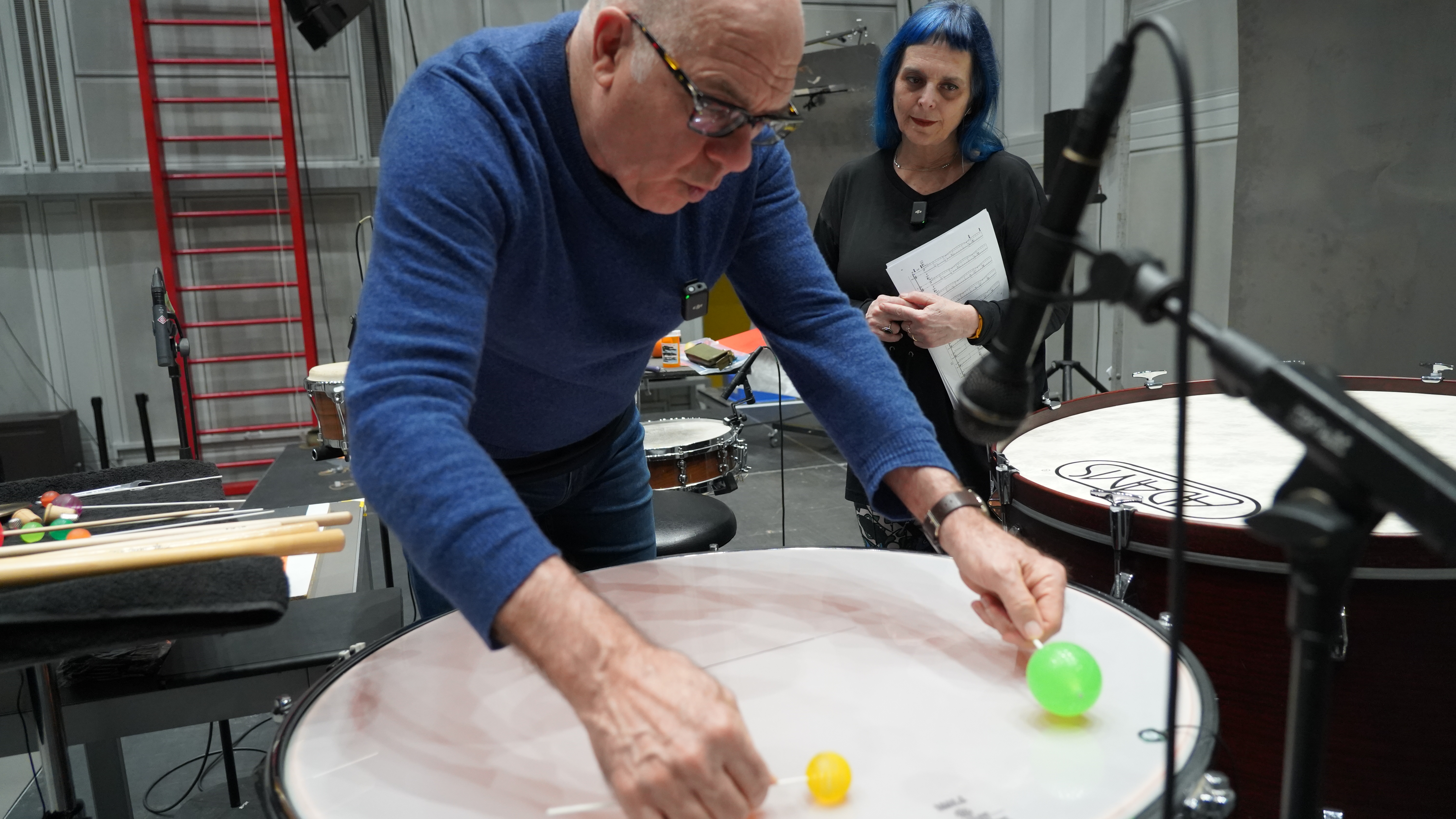 Chaya Czernowin et le percussioniste Steven Shick en répétitions à l'Espace de projection pour Poetica © Deborah Lopatin
Chaya Czernowin et le percussioniste Steven Shick en répétitions à l'Espace de projection pour Poetica © Deborah Lopatin
Vous avez une grande expérience dans le domaine du théâtre. N’y a-t-il pas une certaine dimension dramatique à cette pièce, qui se rapprocherait presque d’un opéra ?
Cette pièce a tout à fait une dimension opératique. On pourrait même l’appeler « opéra de la respiration », ou bien « opéra du souffle ».
Avez-vous avec POETICA la volonté de proposer une nouvelle façon de communiquer non seulement entre le son et l’électronique, mais aussi avec le public ?
Il s’agit plutôt d’une communication entre les couches constituant la pièce, tandis que l’on descend de plus en plus profondément dans cette conscience. Il y a une connexion entre les différents espaces au sein d’un même esprit. Mais cet « opéra du souffle » laisse aussi entrevoir une certaine objectivité : pendant que toute cette conversation interne se joue, on peut entendre des sons provenant de manifestations. J’ai été témoin des manifestations qui ont eu lieu à Paris et à Tel Aviv, et j’en ai vu d’autres à la télévision aux États-Unis. J’ai décidé de les enregistrer et d’y ajouter d’autres sources. Ces sons apportent une dimension externe à la pièce et donne l’impression que l’ensemble essaye de survivre face au monde qui brûle. Car quand on y pense, qu’est-ce qu’une manifestation ? Ce n’est rien de plus qu’un rassemblement de milliers de gens qui clament ce qui leur tient à cœur, ou de ce qui les révolte. Ce que l’on entend, donc, ce sont les cris d’un monde mécontent, qui n’a aucun contrôle face aux changements permanents. Et face à ce monde qui malmène notre capacité à rester humain, nous devons nous battre. C’est ce que nous faisons lorsqu’on se concentre sur sa respiration – la façon dont elle monte et descend, comme un acte méditatif, face à un monde changeant et perfide.
Vous créez une relation entre directivité et lenteur – un sujet très complexe dans le domaine de la composition musicale. Comment y parvenir ?
Auparavant, on considérait dans le domaine de la musique, trois catégories : des processus, des espaces et des événements. Aujourd’hui, on découvre qu’il n’y a pas de division si dialectique, et que ces catégories sont plutôt sur un continuum. Quand on est dans un espace, bien qu’il soit cyclique, comme la respiration, on observe qu’un lent processus s’y infiltre et rend la respiration plus profonde, plus lourde. Il devient alors difficile de respirer, sans pour autant que le processus lui-même soit difficile, et un certain temps peut s’écouler avant que nous prenions conscience de ce changement. La vitesse (ou ici, lenteur) dépend du degré d’investissement dans l’espace et dans le processus. Un développement rapide amène à la réalisation du processus, tandis qu’un développement lent amène dans la dimension spatiale. L’espace n’est jamais figé, il est en constante évolution. Ce qui est fixe c’est plutôt la notion d’échelle temporelle, qui est également importante à prendre en compte.
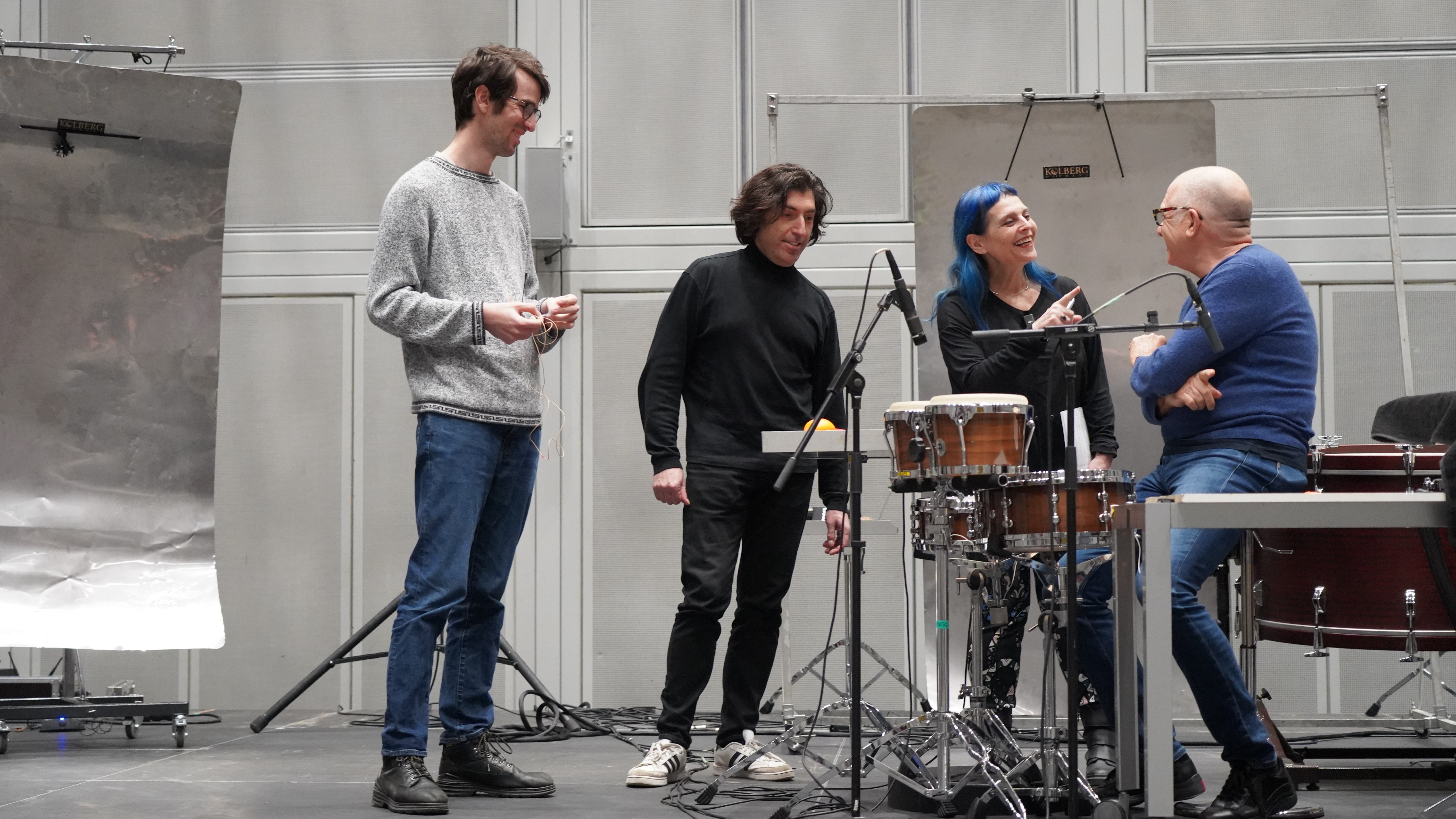 L'ingénieur du son Clément Cerles, le RIM Carlo Laurenzi, Chaya Czernowin et Steven Shick en répétitions à l'Espace de projection © Deborah Lopatin
L'ingénieur du son Clément Cerles, le RIM Carlo Laurenzi, Chaya Czernowin et Steven Shick en répétitions à l'Espace de projection © Deborah Lopatin
Vous avez donc toujours foi en la musique écrite ? On parle beaucoup de la fin de la séparation entre le métier de compositeur.rice et d’interprète, et de l’émergence d’un métier hybride. Quelle est votre opinion sur ce sujet ?
Je suis quelqu’un de très ouvert, et j’encourage le changement, car je pense que toute prise d’initiative peut être bénéfique. Pourquoi devrions-nous toujours faire des choix ? Il ne s’agit pas d’une dialectique, et je pense que les personnes qui défendent ce point de vue sont des opportunistes. Ce que nous devons combattre, c’est la montée des phénomènes de popularisation et de commercialisation, ce qui est difficile, surtout pour celles et ceux qui sont en marge de ces mouvements et souffrent d’un manque de visibilité. En dehors de cela, je considère toute expérimentation comme la bienvenue, même si cela ne correspond pas à ce que je crois, car cela peut être le moyen d’apprendre quelque chose de nouveau.
Vous faites donc un éloge de la diversité, en dehors du marché.
Plutôt que de marché, je parlerais d’arène d’idées. Je peux tirer des enseignements de la danse hip-hop, de l’émergence de ce métier hybride de compositeur-interprète, de très nombreuses choses... Ce n’est pas pour autant que je dois nécessairement me saisir de chaque nouvelle opportunité. Le plus important pour moi est surtout de toujours chercher à me remettre en question afin d’évoluer et de ne pas rester figée. Plus tôt, je vous ai dit que POETICA était constituée de couches. Je pense qu’il y a également des « couches » temporelles, ce qui nous amène à certaines réflexions existentielles. Que restera-t-il de nous plus tard? Existe-t-il quelque chose d’infiniment plus grand que nous ? Moi, j’ai choisi de me battre pour la substance et la durabilité, et avant tout pour plus de profondeur. Je pense que c’est cela qui nous fait cruellement défaut dans notre société, le manque de profondeur.
Cette liberté que vous souhaitez conserver, cette singularité, serait le combat que vous menez ?
C’est un combat, absolument. C’est d’ailleurs exactement le sujet de POETICA, ainsi que d’Infinite now. Une individualité, avec toutes les couches qui constituent sa mémoire, survivant au sein d’un environnement hostile. La respiration est alors une tentative désespérée pour essayer de rester en vie.
Propos recueillis et traduction réalisée par Pauline Destouches
Biographie
Chaya Czernowin
Compositrice (née en 1957)
Chaya Czernowin grandit en Israël et se forme en premier lieu à l’Académie de musique Rubin de Tel Aviv. À partir de ses vingt-cinq ans, ses études se font nomades : l’Allemagne, d’abord, grâce à une bourse du DAAD, l’université de Californie, ensuite, pour terminer son doctorat, puis c’est le Japon, l’Akademie Schloss Solitude et Vienne, enfin. Elle reçoit ainsi des enseignements aussi divers que ceux d’Abel Ehrlich, Yizhak Sadaï, Dieter Schnebel, Eli Yarden, Joan Tower, Brian Ferneyhough ou Roger Reynolds. Professeure à l’université de Californie à San Diego (UCSD), puis à l’université des arts de Vienne, elle enseigne depuis 2009 à l’université de Harvard.
Sa musique se caractérise par l’utilisation de métaphores comme moyen d’organiser un univers sonore inhabituel et d’échapper aux conventions ; par son travail sur le son et ses paramètres physiques tels que le poids, les textures (soyeuse ou rêche, par exemple) pour créer des entités sonores qui « vivent » dans un champ où perspectives et distances évoluent ; par l’exploration de l’énergie musicale de la nature, du temps musical et de son développement ; et par les glissements d’échelle et de point de vue. Tous ces aspects contribuent à « peler » les objets familiers pour révéler l’essentiel qui s’y dissimule.



